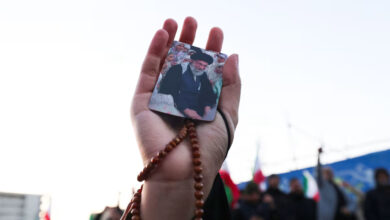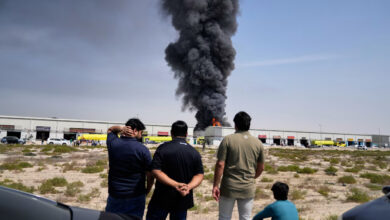US officials are in talks with Egypt over a plan to make the Middle East a nuclear-free zone, part of an effort to block the Iranian nuclear program, The Wall Street Journal reported on Saturday.
Two days ago, a top Arab diplomat deemed the US proposal as ‘unrealistic’, saying that it is conditional on reaching a conclusive peace agreement between Israel and its Arab neighbors.
Citing unnamed US officials, the New York-based newspaper said the White House wanted to build on a non-binding agreement that emerged from a 1995 UN review of the Non-Proliferation Treaty (NPT).
That agreement had designated the region as a zone free of weapons of mass destruction: the aim now was to promote a Middle East nuclear weapons-free zone, which would include Israel, the Arab states, Iran and Turkey.
The US administration was also seeking a conference on the subject.
US officials said talks with Egypt would resume in New York in the coming month during the month-long nuclear Non-Proliferation Treaty (NPT) review conference, the paper said.
“We’ve made a proposal to them that goes beyond what the US has been willing to do before,” the Journal quotes one senior US official as saying.
However, US officials stressed that they didn’t believe progress in the nuclear-free zone talks would happen without first achieving major advances in Arab-Israeli peace talks, the paper noted.
The United States had also discussed the proposal with the Arab League and other members of the Non-Aligned Movement, the paper reported, quoting Ellen Tauscher, undersecretary of state for arms control and international security.
But this latest initiative could raise new tensions between President Barack Obama and Israeli Prime Minister Benjamin Netanyahu, The Journal said.
On Thursday, Wael Al-Assad, head of the Arab League delegation to the NPT review conference said that a joint US-Russian proposal was presented to Arab states where Israel’s inclusion in the treaty was conditional on reaching a comprehensive peace agreement in the Middle East.
Assad added that the Arab League rejected the proposal, although he noted that it bears “some positive elements that deserve further discussion.”
“Arab states had long joined the NPT before signing a peace agreement, so why shouldn’t Israel be exempted on that grounds,” Assad told the Egyptian MENA news agency.
Israel has never publicly acknowledged having nuclear weapons, maintaining a policy of deliberate ambiguity since it inaugurated its Dimona nuclear reactor in 1965.
It is not a party to the NPT, which requires international inspections.
A new nuclear Non-Proliferation Treaty review summit opens Monday at UN headquarters in New York. Iranian President Mahmoud Ahmadinejad is expected to participate.
The summit comes as the United States and its partners seek to craft a new UN resolution imposing a fresh round of sanctions against Tehran over its nuclear program.
On Tuesday, Egypt’s UN Ambassador Maged Abdel Aziz said that establishing a Middle East nuclear-free zone at the nuclear Non-Proliferation Treaty (NPT) review conference was the key to resolving the nuclear standoff with Iran.
Iran denies the charges that its civilian nuclear program hides a covert quest for an atomic arsenal, but has refused to freeze uranium enrichment, which can be a key step towards developing a nuclear weapon.




